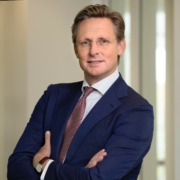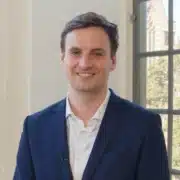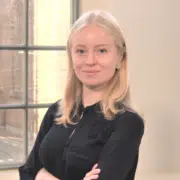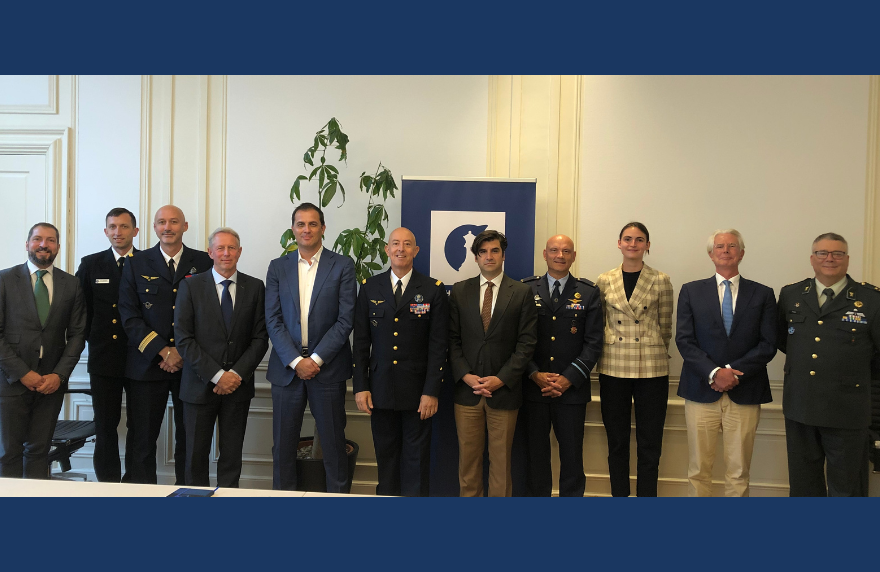On Wednesday, March 22, the Minister of Defence for the Netherlands Kajsa Ollongren visited the Hague Centre for Strategic Studies (HCSS), where she attended several briefings from our strategic analysts on HCSS research and analysis. She was welcomed by HCSS founder Rob de Wijk, followed by a short introduction with director of political affairs Han ten Broeke and director of research Tim Sweijs.
Director of research Tim Sweijs stated: “We are happy to receive this acknowledgement, to see that Her Excellency appreciates the enormous importance of having direct access to a deep national knowledge base on international security, defence and strategy, and to the international networks that HCSS has nurtured for almost 16 years now – a vital asset at a time of enormous international turbulence.”

Strategic analyst Joris Teer proceeded to give a briefing on the vulnerability of our sea-based critical infrastructure, one week after the Royal Dutch Navy escorted 2 Russian military ships as they passed through the Dutch part of the North Sea. The incidents that destroyed the Nord Stream pipelines bore striking similarity to one of the scenarios described in our 2021 report “The High Value of the North Sea”, which warned of the dangers to the numerous pipes, installations and cables that lie relatively unprotected off the coast or are still being constructed.
The Netherlands faces a number of major transitions, including in the area of digitisation and key technologies. The achievement of these objectives partly depends on foreign supplies of rare earth metals. This creates novel geopolitical dependencies and geo-economic challenges such as the importance of Taiwan to the supply of semiconductors, as highlighted in the HCSS report Reaching Breaking Point. Furthermore, the American-Chinese technology competition has far-reaching consequences worldwide.

The Minister was subsequently given an update by strategic analysts Paul van Hooft and Davis Ellison on the return of great power competition, as they provided an in depth look at the HCSS research programmes Europe in the Indo-Pacific, the Future of Transatlantic Relations and Strategic Stability: Arms control and Deterrence.
The principal premise underlying these programmes is that Europe and the Netherlands must be more proactive and take on greater responsibility, given the close connectedness between the Atlantic and the Indo-Pacific theatre, where China has emerged as a challenger. The access to the global sea lines of communication that connect European economies to those in Asia is of key economic concern of Europe, but the increased militarisation of Asia may come to impede these global supply chains – and undermine the multilateral order upon which small and middle powers in Europe and Asia depend.

In the HCSS Datalab, Minister Ollongren was briefed on Critical Materials and Defence by strategic analyst Benedetta Girardi, who stressed that raw materials are not essential for Europe’s energy and digital transitions, but their importance to the military domain is also equally vital. Over forty critical and ‘soon-to-be’ critical raw materials are deemed strategic for the European defence industry in a recent HCSS report. These are used across the air, sea, and land domains in various military applications and components. Securing the supply of strategic raw materials for defence requires cooperation between the civil and military domain, cooperation at the European level to overcome supply-related obstacles, and transatlantic dialogue to ensure the supply of military technology.
Strategic analyst Linde Arentze then informed the Minister on how emerging technologies pose new Hybrid Threats, and how these can be confronted through building resilience and deterrence capability. Disinformation, especially Russian interference, is a growing threat, and this can be confronted through international cooperation and norms. When Joseph Borrell announced the establishment of a Disinfo ISAC (i.e. an international platform for information exchange on countering disinformation), this was a direct implication of an HCSS recommendation.

Increased investment in innovation and high-tech is urgently needed in order to strengthen our security and defend against new threats, Ollongren confirmed following her announcement this week that the Netherlands is to be the home base of the headquarters of the NATO Innovation Fund, in line with the ambitions of the Ministry of Defence to innovate in the field of so-called Emerging & Disruptive Technologies (EDTs).
Linde continued her briefing on the HCSS ‘Platform Influencing Human Behaviour’, which was created to facilitate debate on information manoeuvre and behavioural influencing in the military domain. Special mention was also made on the work HCSS has been doing for years on the effects of Artificial Intelligence in the military domain. Finally, Linde provided an in depth look into the opportunities and advantages that Robotics and Autonomous Systems pose for the armed forces, but also what ethical and legal issues arise with their implementation.

HCSS was founded by Rob de Wijk almost 16 years ago. In this changing geopolitical and geoeconomic world order, the state-of-the-art strategic research and services provided by HCSS, as well as our extensive international knowledge network, are essential for the Dutch Defence organisation – and the Netherlands.
This Sunday, Minister Ollongren will also be the special guest on our Podcast ‘De Strateeg’ on BNR Nieuwsradio.













